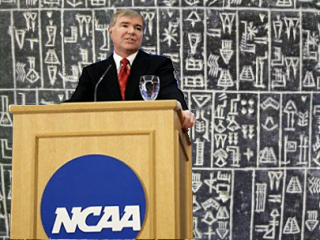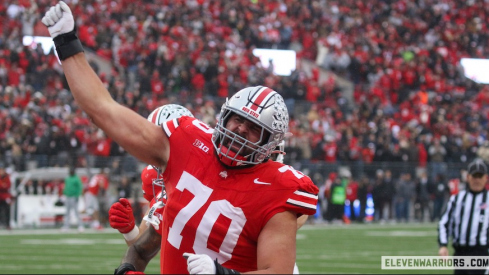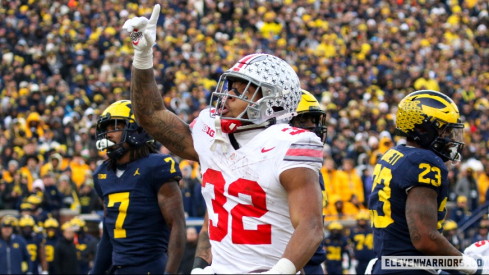 Going back to our roots
Going back to our rootsIn response to a glut of recent controversies surrounding the payment of college football athletes for various services rendered, including autograph signings by Texas A&M star Johnny Manziel that allegedly netted the QB upwards of five figures, the NCAA has decided to institute the Code of Hammurabi for the 2014 football season.
"Well, we looked at various codes of law throughout history, the Magna Carta, Sakoku, the Twelve Tables of Roman Law, and so on. But really when it came right down to it, no rule of order really encompasses the ideals of the NCAA quite as well as the nearly 4000 year old Code of Hammurabi," NCAA president Mark Emmert stated on Tuesday.
Standing in front of a large stone slab etched with cuneiform writing, Emmert went on to say that while some adjustments the the original text were necessary, he hoped that he was able to preserve its spirit.
"The Code of Hammurabi is great because it has so many practical applications for what we're trying to achieve here; not just in terms of setting a moral standard for our student-athletes off the field, but also making sure that they understand that their actions on the field will have consequences."
In a 25 minute PowerPoint presentation to several dozen athletic directors from around the country, Emmert explained how the NCAA would incorporate the social code first instituted by the famous king of ancient Babylon.
According to the NCAA president, the new moral code for student-athletes would ensure that off the field incidents would be kept to a strict minimum, especially relevant in light of recent events involving Ohio State's Carlos Hyde and Bradley Roby and LSU's Jeremy Hill assaulting a man outside of a bar.
"I mean, really the only changes we had to make were in terms of terminology. Pretty much any item of value such as 'horse,' 'ox,' or 'cow' becomes 'money gained from selling autographs or personal items,' 'man' and 'owner' becomes 'coach,' and of course 'slave' becomes 'student-athlete.'"
In attendance was Big Ten commissioner Jim Delany, who asked for examples that schools could refer to in the event of a violation. To answer his question, Emmert was prepared with a series of slides that showed how this implementation would work in theory:
- If a booster shall give a player a dowry, the player's left hand shall be cut off and the booster will pay the NCAA two shekels
- If a player or players is caught making an offensive rap song in their dorm, specifically between the 6th and 8th floors, their feet shall be cut off and they will pay to their university six pounds of corn each
- If a player desires to transfer from one school to another, they shall be buried up to the neck and three jars of ants shall be poured on their faces
- If a player desires to profit off their own image, they must play their former school five shekels, sit out a season, and have their foreheads cut with a knife to denote their treachery
Holding an overripe tomato in his right hand, Emmert plunged an Exacto knife into the soft, supple flesh of the garden fruit to demonstrate proper scarring technique.
 Literally the very devil himself
Literally the very devil himself"The trick is to make sure the player holds his head still, because otherwise you might end up taking out an eye. And no one wants to be on the hook for another eye! That quid pro quo clause can be a real bitch," said the chief policy maker for the NCAA.
The new code wasn't just limited to off the field transgressions. Emmert also made clear that the concept of ejections for reckless hits instituted by the Big Ten will be adopted and expanded upon, all according to the will of a man who conquered Kish and Sippar. According to Emmert:
- Helmet-to-helmet hits will be punished by transferring one players' concubine to the victim, or, if player has no concubine, three reams of silk
- A player found taunting before a touchdown will not only result in a loss of said touchdown, but the player will also be stoned to death at midfield
- Woody Hayes would've faced zero repercussions whatsoever
Emmert's nostrils flared, his eyes turning a deep shade of red and his terrible visage grew large and frightening as he noted that in an era where NCAA rules and regulations were being challenged more than ever, the organization would clearly have to make some changes to stay relevant.
"We need to move forward, and to do so, we needed to look backward. Paying players, relaxing restrictions on endorsements, allowing athletes to sell their own property? None of these values are consistent with the will of our god Marduk! THE GREAT MASTER HAMMURABI HAS LED THE WAY! LET US SEE THAT MARDUK'S WILL BE DONE! SARRUM LA SANAN! SARRUM LA SANAN!"
Emmert then presented to the assembled athletic directors a jar full of severed ears obtained from Sun Belt players who had neglected to report their involvement at a youth summer camp.
"EAT OF THEIR FLESH, MY FRIENDS. THEY ARE BUT ANTS BENEATH OUR FEET."
After the subsequent feast, Jim Delany had this to say about current counter-proposals to relax NCAA restrictions on player pay.
"He (Manziel) knew the rules of the game when he came (to Texas A&M)," Delany said. "If you don't agree with the rules of the game, he can go into another game. ... If you want to get paid, if you want to market yourself, there are a variety of ways you can do it. In Europe, in Arena Football, you can fight to change the rules to leave college early, but as long as you're in a system with a thousand other athletes, you abide by the rules.
Delany then wiped the blood from his mouth, adjusted his toga, and shuffled back to the ongoing orgy.

